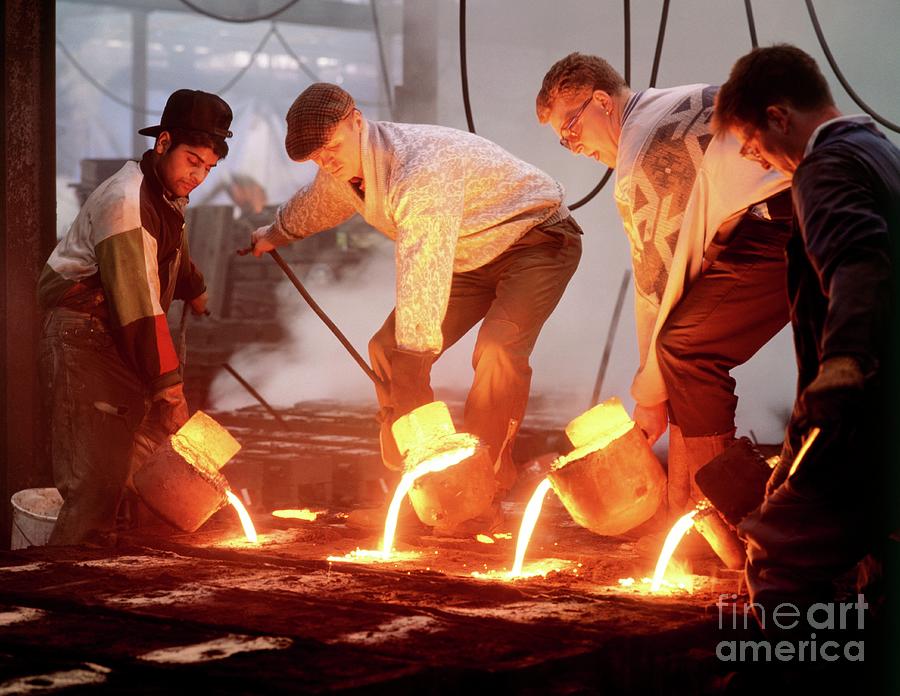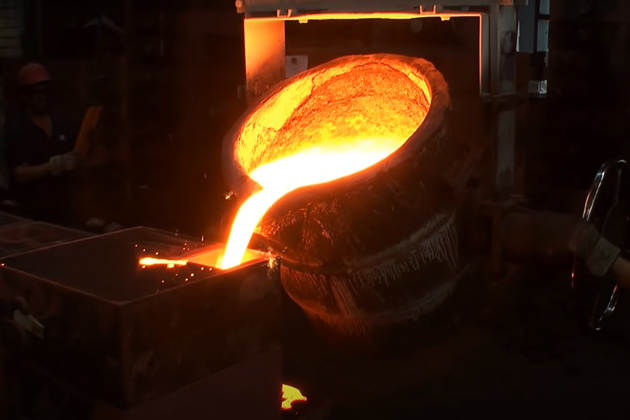Inside look at the innovative processes inside a Metal Foundry
How a Metal Foundry Adds To Sustainable Metal Production Practices
Metal foundries play a vital duty in promoting sustainability within the metal manufacturing market. By integrating recycled materials, they reduce dependence on virgin resources and decrease environmental influences. Energy-efficient melting processes additionally decrease energy intake and exhausts. The journey toward sustainable techniques entails more than just reusing and energy management. It encompasses a broader dedication to honest sourcing and innovative modern technologies. The ramifications of these techniques are considerable and warrant closer examination.
The Duty of Recycling in Metal Foundries
While metal production has actually generally relied upon virgin materials, the boosting emphasis on sustainability has actually caused a substantial change in methods, specifically in metal foundries. Recycling has become an essential part of this makeover, enabling foundries to repurpose scrap metal and minimize reliance on mined resources. By incorporating recycled materials right into their processes, foundries not only decrease ecological influence but likewise lower manufacturing costs.
Using recycled metals, such as copper, aluminum, and steel, reduces power consumption and decreases greenhouse gas discharges linked with traditional mining and refining methods. Moreover, foundries can attain high-grade results by employing sophisticated sorting and handling modern technologies to ensure the pureness of recycled products. This emphasis on reusing fosters a circular economy, where waste is lessened, and resources are made use of efficiently. Subsequently, metal foundries play an essential role in promoting lasting techniques within the metal production industry.
Energy-Efficient Melting Methods
Energy-efficient melting methods are vital for enhancing sustainability in metal production. These techniques substantially reduce energy usage during the melting procedure, which is one of the most energy-intensive stages in metal production. Technologies such as induction melting, resistance home heating, and microwave melting offer boosted efficiency contrasted to typical methods. Induction melting, for example, makes use of electro-magnetic fields to generate warm straight within the metal, decreasing energy loss and offering specific temperature level control.
Additionally, executing warm healing systems can better boost effectiveness by reusing and catching waste warm generated during melting. Employing advanced insulation materials and optimizing furnace designs also add to power financial savings. By embracing these innovative melting techniques, metal foundries can decrease their carbon footprint, minimize functional prices, and add to a more lasting manufacturing landscape. The integration of energy-efficient techniques not only aligns with ecological objectives but likewise satisfies the growing demand for liable production approaches in the metal sector.
Lasting Sourcing of Raw Materials
Lasting sourcing of basic materials is crucial for lessening the environmental impact of metal production. This includes the enhanced use of recycled metals, the fostering of honest mining techniques, and initiatives targeted at regional sourcing. By focusing on these strategies, the industry can promote responsible resource administration and support local economic situations.

Recycled Metal Use
Exactly how can industries effectively minimize their ecological influence while satisfying the growing demand for metal? One significant approach is the usage of recycled metal. By incorporating scrap metal right into their manufacturing procedures, foundries can decrease the removal of virgin products, consequently reducing and preserving all-natural resources energy intake. Recycled steels need much less energy to procedure compared to their raw equivalents, causing reduced greenhouse gas discharges. In addition, making use of recycled metal helps divert waste from landfills, advertising a circular economic situation. Industries that focus on recycled metal not just add to sustainability however additionally take advantage of expense financial savings connected with minimized product purchase. Subsequently, recycled metal application stands as a necessary technique for eco responsible metal manufacturing.
Ethical Mining Practices
While the need for metals continues to rise, sectors are progressively acknowledging the value of honest mining methods in making certain responsible sourcing of basic materials. Honest mining incorporates a commitment to environmental stewardship, social responsibility, and adherence to reasonable labor techniques. Business are currently prioritizing collaborations with mines that demonstrate openness in their procedures, reducing eco-friendly effect and appreciating neighborhood communities. This strategy not just promotes a sustainable supply chain however additionally boosts the credibility of businesses involved. By applying rigorous standards and certifications, industries can fight illegal mining tasks and promote the well-being of employees. Eventually, moral mining techniques add markedly to an extra sustainable metal manufacturing environment, aligning financial development with ecological and social integrity.
Local Sourcing Campaigns

Developments in Metal Casting Processes
Innovations in metal casting procedures are changing the sector by including innovative recycling techniques that decrease waste. Energy-efficient melting methods are additionally being created to reduce energy consumption during manufacturing. In addition, making use of innovative mold products adds to improved performance and sustainability in casting procedures.
Advanced Recycling Techniques
Advanced recycling methods are changing metal casting procedures, substantially enhancing sustainability in the industry. These innovations concentrate on redeeming and reprocessing scrap metal, substantially lowering waste and the need for virgin materials. Methods such as hydrometallurgy and pyrometallurgy allow foundries to remove beneficial metals from utilized parts, making certain reliable source utilization. In addition, progressed sorting and purification innovations improve the high quality of recycled steels, making them appropriate for high-performance applications. This not just reduces the environmental impact of metal manufacturing however likewise promotes a round economic situation by promoting the reuse of products. As these recycling methods remain to develop, they promise to additionally enhance operations within foundries and contribute to a click to read more sustainable metal manufacturing landscape.
Energy-Efficient Melting Approaches
While conventional melting methods have long been the backbone of metal casting, recent developments have presented energy-efficient techniques that substantially decrease power usage and exhausts. Technologies such as induction melting and electrical arc heaters have actually acquired prominence, permitting precise control over temperature level and decreasing the requirement for fossil gas. These techniques not only improve energy efficiency yet additionally advertise quicker melting times, which translates to reduce operational costs. Additionally, advancements in heat healing systems enable foundries to capture and reuse excess warmth created during the melting procedure. This all natural method to power administration not just supports lasting practices her latest blog however also settings metal foundries as leaders in the change towards greener production processes, even more aligning with international sustainability goals.
Innovative Mold Products
As the demand for more sustainable and effective metal casting processes expands, the exploration of ingenious mold and mildew materials has become a centerpiece in the industry. Standard mold and mildew materials typically add to environmental obstacles, prompting the search for alternatives that reduce waste and power consumption. Recent innovations consist of the advancement of recyclable compounds and eco-friendly binders, which not only improve mold efficiency but additionally lessen environmental influence. Additionally, the usage of 3D printing modern technology in mold and mildew production permits complex layouts that reduce material use and allow quick prototyping. These innovative materials not only boost casting accuracy however likewise line up with sustainability goals, showcasing the sector's commitment to reducing its carbon footprint while maintaining premium manufacturing standards.
Decreasing Waste Via Advanced Modern Technology
Ingenious innovations are changing the metal manufacturing industry by considerably lowering waste and boosting efficiency. Advanced data analytics and maker knowing formulas enable foundries to maximize manufacturing procedures, reducing and determining inadequacies scrap material. Smart sensing units keep an eye on tools performance in real-time, allowing for anticipating maintenance that minimizes downtime and waste generation. Furthermore, additive production techniques, such as 3D printing, permit for the production of facility parts with marginal product usage, significantly lowering waste contrasted to traditional approaches.
Closed-loop systems are becoming a lot more common, in which scrap metal and by-products are recycled back right into the production cycle, making certain that products are used to their maximum potential. This integration of technology not only promotes source preservation however additionally enhances the overall sustainability of metal manufacturing techniques. By embracing these advancements, foundries can add to a much more sustainable future while maintaining competitiveness on the market
The Influence of Foundries on Carbon Footprint Decrease
Foundries play a crucial role in minimizing the carbon impact of the metal production sector by applying various lasting techniques. By using energy-efficient innovations, such as electrical arc furnaces, these centers substantially lower greenhouse gas exhausts compared to conventional approaches. Furthermore, foundries progressively embrace eco-friendly energy resources, which likewise lessens their dependence on nonrenewable fuel sources.
Recycling scrap metal is another vital technique that foundries utilize, saving resources and minimizing the demand for virgin materials. This not only decreases waste yet likewise lowers the energy-intensive removal processes connected with mining. The fostering of closed-loop water systems aids to decrease water usage and lower wastewater discharge, contributing to a more sustainable procedure.
Via these initiatives, foundries demonstrate their commitment to environmental stewardship, causing a significant decrease in the overall carbon impact of the metal manufacturing market. Their ongoing initiatives are critical in the change towards a much more sustainable commercial landscape.
Regularly Asked Inquiries
What Types of Metals Are Most Commonly Recycled in Foundries?
Aluminum, copper, steel, and brass are among one of the most commonly recycled metals in foundries. These steels are preferred because of their high recycling prices, economic value, and prevalent schedule, adding considerably to industrial sustainability efforts.
How Do Foundries Ensure the Quality of Recycled Materials?
Foundries identify the quality of recycled materials through strenuous screening, arranging, and purification procedures. They carry out sophisticated modern technologies to analyze composition and eliminate impurities, guaranteeing that the recycled metals meet market requirements for efficiency and safety and security.
What Accreditations Exist for Sustainable Foundry Practices?
Numerous qualifications exist for lasting foundry methods, including ISO 14001 for environmental administration, ISO 50001 for energy monitoring, and LEED qualification for sustainable building techniques (Aluminum Foundry). These qualifications aid ensure adherence to ecological and sustainability criteria in procedures
How Do Foundries Determine Their Carbon Impact Decrease?
Foundries measure carbon impact decrease via tools like lifecycle assessments, energy audits, and exhausts tracking systems. find out this here They contrast standard discharges to current results, assessing enhancements in energy effectiveness, material usage, and renewable resource fostering with time.
What Are the Economic Advantages of Sustainable Metal Production?
Lasting metal production uses economic benefits such as minimized functional prices, enhanced efficiency, boosted market competitiveness, and potential government incentives. In addition, it promotes innovation and attracts ecologically mindful consumers, ultimately driving lasting productivity for services.
Metal foundries play a crucial duty in promoting sustainability within the metal production industry. While metal manufacturing has actually generally depended on virgin products, the raising focus on sustainability has led to a considerable shift in practices, especially in metal foundries. By incorporating scrap metal into their manufacturing processes, foundries can reduce the extraction of virgin materials, thereby lowering and conserving all-natural sources energy consumption. Foundries play an essential duty in minimizing the carbon footprint of the metal manufacturing sector by executing various sustainable practices. Recycling scrap metal is another important method that foundries employ, conserving sources and lowering the requirement for virgin materials.